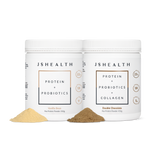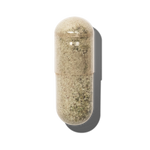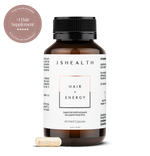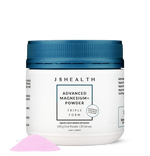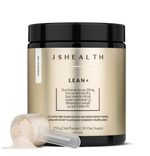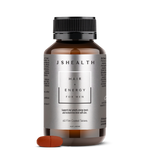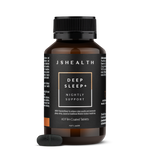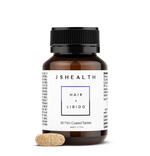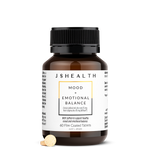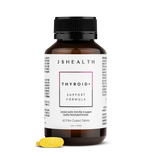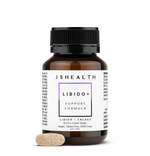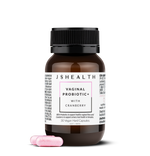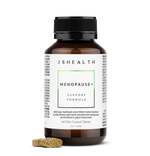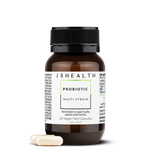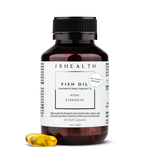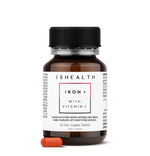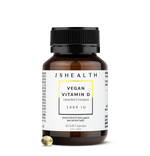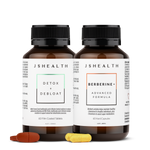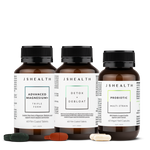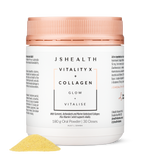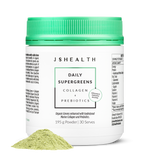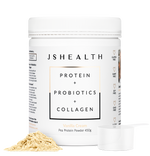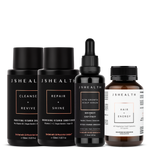Fuel Your Day: Power-Packed Superfoods
In the bustling life of modern women, balancing work, family and self-care often requires a lot of energy. And most of us feel like we can never have quite enough! One key to having a sufficient and steady energy supply throughout the day is eating the right kind of food.
The core of the JSHealth philosophy is a balanced diet, focusing on nutrient-dense whole foods that not only fuel our bodies but also nourish our minds.
What Role Does Food Play in Our Energy Levels?
Essentially, every food we consume is converted into energy. Our body breaks down the carbohydrates in our food into sugars, such as glucose, which are absorbed into our bloodstream.
As our blood sugar levels rise, our pancreas produces insulin, a hormone that allows glucose to be taken up by cells and used for energy.
The type of carbohydrates you consume can significantly impact your energy levels:
- Complex carbohydrates, like those found in whole grains and legumes, provide a steady release of energy as they are slowly broken down and absorbed into our bloodstream.
- Simple sugars, on the other hand, are rapidly absorbed, leading to a quick spike in energy followed by a “sugar crash” that can leave us feeling tired and low in energy.
Choosing foods with complex carbohydrates and avoiding those with added sugars is a key strategy for maintaining steady energy levels throughout the day. Remember to prioritise balance, not restriction!
What Are the Best Foods for Sustained Energy?
Energy doesn't just come from a cup of coffee or an energy drink — although, who doesn’t love a latte? It's also fueled by the nutrients we consume daily. A well-balanced diet full of whole foods is your best bet for achieving sustained energy, keeping those energy dips and midday naps at bay.
Here are some superfoods that our dietitians recommend for promoting energy levels:
Blueberries
Blueberries, although small in size, are abundant in health-supporting antioxidants like anthocyanins. These compounds contribute to overall health and support cognitive function, furthering your body's ability to convert food to energy efficiently.
The fibre content in blueberries provides an additional benefit, slowing the absorption of sugar into your bloodstream. This aids in maintaining a consistent energy level, steering clear of rapid energy peaks and sluggish valleys that lead to a glycaemic reaction.
Peanut Butter
Peanut butter is a nutrient-dense staple in many pantries — for good reason. Full of heart-healthy fats and protein, it's a source of sustained energy, perfect for those busy days when you don’t have time for something more.
The protein content and dietary fibre offer a sense of fullness that lasts. This keeps overeating at bay while helping to manage your energy and blood sugar levels throughout the day, cementing peanut butter's place among the ranks of healthy foods.
Pistachios
Among the assortment of healthy nuts, pistachios stand out for their unique nutrient profile. They contain heart-healthy fats, fibre and protein, making them an ideal food for maintaining energy levels.
The fibre content in pistachios helps regulate blood sugar and cholesterol levels, contributing to cardiovascular health and sustained energy levels. They’re a great source of protein and offer numerous other health benefits, making them a worthwhile addition to any diet. And they’re delicious — it’s truly a win-win situation.
Brown Rice
As a staple grain, brown rice offers more than just fullness. It's rich in complex carbs like fibre, which are crucial in maintaining consistent blood sugar levels. By doing so, it ensures a slow, steady release of energy, eliminating the dreaded energy crashes often associated with refined grains.
The nutrient-dense profile of brown rice also promotes healthy eating habits, furthering your body's ability to efficiently convert food into usable energy.
Greek Yoghurt
Greek yoghurt is often touted for its high protein content, which provides a source of energy and aids in slowing down digestion. This leads to a longer-lasting energy boost, helping you maintain productivity throughout the day.
Additionally, Greek yoghurt contains several B vitamins, including vitamin B12 and vitamin B6. These vitamins play an integral role in energy production within the body and contribute to maintaining a healthy blood pressure level, underscoring the yoghurt's status as a nutrient powerhouse.
Sweet Potatoes
Sweet potatoes are known for their bright colour, sweet flavour and impressive nutrient profile. They're high in complex carbohydrates, fibre and vitamin C, providing a slow, sustained source of energy.
They also offer a considerable amount of potassium, a mineral vital for various bodily functions, including blood pressure regulation. This combination of nutrients can help you keep up with your energy demands while promoting overall health. Who knew sweet potato fries could be nutritious and delicious?
Chia Seeds
Chia seeds might be small, but they're definitely mighty. Packed with omega-3 fatty acids, protein, fibre and a slew of vitamins like vitamin D, E and B vitamins, they're an energy-boosting superfood.
These nutrients work together to provide sustained energy throughout the day, helping you meet your daily demands with ease.
Lentils
As a legume, lentils are a reliable source of plant-based protein and fibre. These nutrients ensure a steady release of energy and help stabilise your blood sugar levels.
Lentils are also rich in B vitamins, key players in the body's process of converting food into energy. Including lentils in your diet is a smart move for sustained energy and optimal health.
Pumpkin Seeds
Pumpkin seeds are a fantastic addition to your diet. High in magnesium, they support numerous body functions, including the conversion of food into energy.
Rich in healthy fats and fibre, they also contribute to feelings of fullness, reducing unnecessary snacking and providing a slow, steady release of energy. This makes them a smart choice for those seeking a balanced diet and sustained energy.
Quinoa
Quinoa, a nutrient-dense grain, is a complete protein, boasting all nine essential amino acids necessary for the body's growth and repair. Its high fibre content also promotes slow digestion, contributing to sustained energy release and maintaining a low energy glycemic index.
Quinoa also has the unique benefit of being gluten-free, making it a great choice for those with gluten sensitivities.
Sardines
Sardines, a small but nutrient-packed fish, are high in protein and omega-3 fatty acids. They provide consistent energy and help regulate cholesterol levels, which can aid in heart health.
Moreover, these fatty fish are an excellent source of vitamin D, which is crucial for overall health, immunity and energy production, reinforcing sardines' role in a healthy, energy-boosting diet.
Chickpeas
Chickpeas, also known as garbanzo beans, are versatile legumes with a dense nutrient profile. They're packed with protein, fibre and complex carbohydrates, which collectively keep your energy levels steady by providing a slow and sustained release of glucose into the bloodstream.
When ground into hummus, chickpeas also transform into a delicious, balanced source of essential nutrients, perfect for snacking or enhancing your meals.
Dark Chocolate
Dark chocolate, particularly those varieties high in cocoa content, has numerous health benefits. It contains a small amount of caffeine and is rich in magnesium, providing an energy boost while also contributing to feelings of satiety. This ensures you feel full and satisfied while enjoying a sweet treat that can help maintain steady energy levels throughout the day.
Spinach
Spinach, among other nutrient-rich leafy greens, is a source of B vitamins, iron and vitamin D. These nutrients are crucial for converting food into energy, maintaining healthy blood cells and supporting immune function.
Regular consumption of spinach can help combat feelings of fatigue and low energy, making it a perfect ingredient for salads, smoothies, or even as a side dish.
Green Tea
Drinking green tea can provide a natural and sustained energy lift thanks to its unique combination of caffeine and L-theanine. This combination can give you a smooth, jitter-free energy boost, making it a healthier alternative to high-caffeine beverages.
Moreover, green tea is packed with powerful antioxidants that promote overall health and well-being. Consider a daily cup for a natural, gentle pick-me-up.
How Can We Incorporate These Energy-Boosting Foods Into Our Day?
Adding energy-boosting foods into your daily diet is simpler (and more delicious) than you might think.
- You can start your day with a smoothie made from Greek yoghurt and blueberries, providing you with a mix of high-quality protein and antioxidant-rich fruits.
- For lunch, a salad or smoothie with leafy greens and lentils can be an excellent energy-sustaining option.
- Opt for some hummus and whole-grain crackers or peanut butter on apple slices for a healthy afternoon snack.
- Dinner could be a hearty bowl of quinoa mixed with a variety of vegetables for added nutrients.
Can Energy Drinks Replace Energy-Boosting Foods?
While energy drinks may provide a quick pick-me-up, they aren't a healthy or sustainable source of energy. Many contain large amounts of caffeine and sugar, which can lead to energy crashes and other health issues over time.
Nutrient-dense whole foods, on the other hand, provide a more sustained and natural source of energy that our bodies are designed to use. For that reason, it’s best to cut back on energy drinks and replace them with some of the foods listed above.
The Bottom Line: Fuel Your Day the Right Way
The way you fuel your body significantly influences your energy levels. You can enjoy sustained energy levels and avoid the dreaded afternoon energy slump by incorporating nutrient-rich, energy-boosting foods into your daily diet. Embrace a balanced diet approach, choose complex carbs over simple sugars and prioritise whole foods for optimal energy.
At JSHealth, we believe in a balanced, holistic approach to health and nutrition. We encourage you to explore the amazing health benefits of incorporating these energy-boosting foods into your daily diet. They can enhance your energy levels and contribute to your overall wellbeing, helping you feel your best every day.
Remember, maintaining high-energy levels is not just about what you eat but also about living a healthy lifestyle that promotes overall wellness. Keep moving, stay hydrated and prioritise sleep to fully energise your day.
Sources:
How Cells Obtain Energy from Food | NCBI Bookshelf
Structure and Function of Complex Carbohydrates | NIH
Energy Drinks | The Nutrition Source | Harvard T.H. Chan School of Public Health
Biochemistry, Essential Amino Acids | NIH
Fiber | The Nutrition Source | Harvard T.H. Chan School of Public Health





